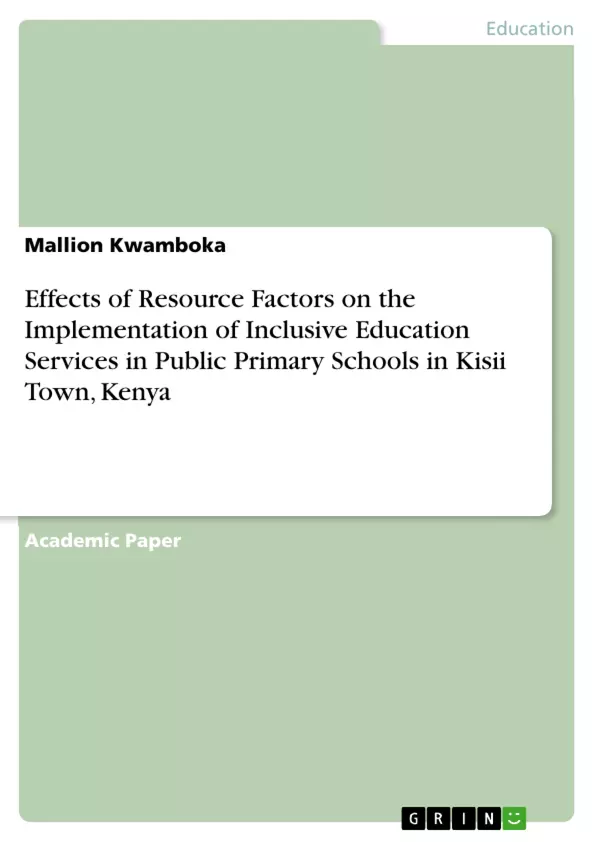This study was designed to investigate the relationship between the resources factors and the implementation of inclusive education in public primary schools in Kisii town, Kisii County, Kenya. The study adopted the descriptive survey design in collecting data.
Contributing to discourses of dependency and development like this, ideas about disability are frequently co-opted to support neocolonial political agendas. In this sense, the links between post-colonialism and disability are direct, dynamic and constitutive in the contemporary world. As a critical discourse, post-colonialism can offer a crucial point of departure for the analysis of disability representations when they are manifested in, or projected onto, non-western cultural contexts. The readiness for acceptance of inclusion varies across countries and continents of the world. While countries within the advanced economies have gone beyond categorical provisions to full inclusion, Kenya and most countries of Africa, are still grappling with the problem of making provisions for children with special needs, especially those with handicaps, even on a mainstreaming basis. Despite the critical role of resources factors in the implementation of inclusive education, this factor has largely escaped scholarly attention.
Inhaltsverzeichnis (Table of Contents)
- INTRODUCTION
- STATEMENT OF THE PROBLEM
- PURPOSE OF THE STUDY.
- RESEARCH METHODOLOGY.
- CONCLUSIONS..
- RECOMMENDATIONS
- REFERENCES...
Zielsetzung und Themenschwerpunkte (Objectives and Key Themes)
This study aims to investigate the relationship between resources factors and the implementation of inclusive education in public primary schools in Kisii town, Kisii County, Kenya. The study seeks to identify and analyze challenges related to resource availability and accessibility for inclusive education in the region.
- The impact of resource limitations on inclusive education implementation
- The relationship between resource factors and the quality of inclusive education services
- The role of government funding and donor support in promoting inclusive education
- The impact of infrastructure and specialized instructional materials on inclusive education
- The challenges faced by teachers and school administrators in providing inclusive education services
Zusammenfassung der Kapitel (Chapter Summaries)
- Introduction: This chapter provides a contextual overview of the study, highlighting the importance of inclusive education and the challenges faced by developing countries in implementing it. It examines existing research on resource limitations and their impact on inclusive education practices in various regions, particularly in Africa. The chapter introduces the focus of the study, which examines the effects of resources factors on the implementation of inclusive education in public primary schools in Kisii town, Kenya.
- Statement of the Problem: This chapter presents a critical analysis of the challenges encountered in providing inclusive education in developing countries. It emphasizes the urgent need for action to address the marginalization and exclusion of children with disabilities in school and society. The chapter highlights the lagging development of special education in developing countries and identifies key factors contributing to this issue.
Schlüsselwörter (Keywords)
Inclusive education, resource factors, public primary schools, Kisii town, Kenya, special needs education, accessibility, infrastructure, instructional materials, teacher training, government funding, donor support.
Frequently Asked Questions
What is inclusive education in the Kenyan context?
It involves integrating children with special needs and disabilities into regular public primary schools to ensure equal access to education.
How do resource factors affect inclusive education in Kisii town?
Limited funding, lack of specialized instructional materials, and inadequate infrastructure significantly hinder the effective implementation of inclusive services.
What is the role of government funding in this study?
The study investigates how government financial support (or the lack thereof) impacts the quality and availability of special needs education.
What are the challenges faced by teachers in Kisii?
Teachers often lack specialized training and the necessary resources to cater to diverse learning needs in a mainstream classroom environment.
What recommendations does the study provide?
The study suggests increased government and donor investment in school infrastructure and specialized training for educators to promote full inclusion.
- Citar trabajo
- Mallion Kwamboka (Autor), 2022, Effects of Resource Factors on the Implementation of Inclusive Education Services in Public Primary Schools in Kisii Town, Kenya, Múnich, GRIN Verlag, https://www.grin.com/document/1239245



